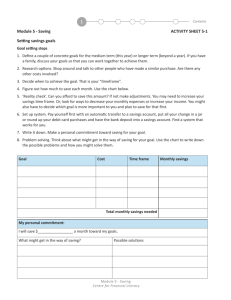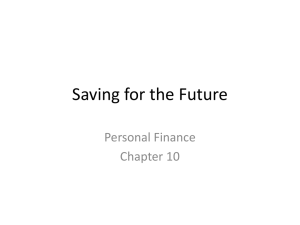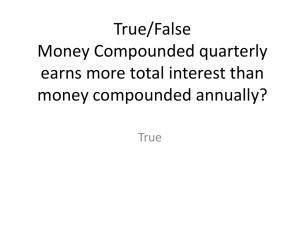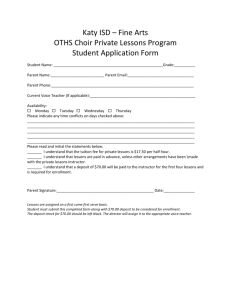PPT Presentation
advertisement
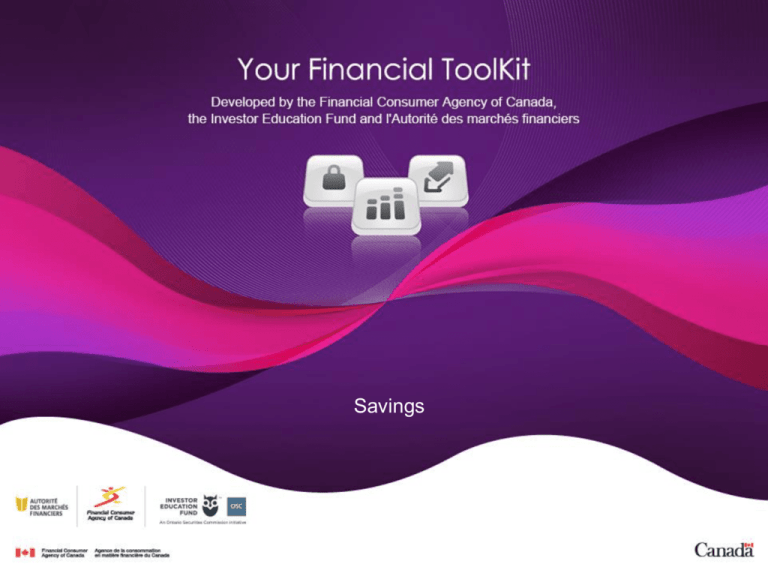
Savings Agenda Start time: _____ Break time: _____ (10 minutes) End time: _____ Please set phones to silent ring and answer outside of the room. Why Don’t People Save? Saving This module covers: • • • • Why saving regularly will help you The power of starting to save early Some tips to make it easier to save Key ways to start saving for your goals Savings Basics Savings Basics This section covers: • • • Why people save—and why they don’t The benefits of starting your savings early Guidelines for a savings plan that works for you Why Save? Reasons people save: • • • • Helps you achieve important goals Gives you security Gives you choices Saves you money Why Save? Emotions, Habits, Behaviours and Your Money What affects your ability to save? • • Financial factors (your income and expenses) Non-financial factors o Emotions o Habits o Behaviours Identify the personal factors that affect your saving and take steps to control them. Steps to Better Financial Decisions Case Study: Saving for Their Future • Sean and Helen o Saved $250 a month, retired after 40 years o Total savings: $260,917 • Macario and Tala o Saved $250 a month but start 10 years later o Total savings: $158,603 Case Study: Saving for Their Future, Details Savings Calculator www.yourmoney.cba.ca Rule of 72 Roughly how long will it take to double my money? Using compound interest: • • 72 ÷ interest rate = number of years to double savings E.g.: 72 ÷ 5% = 14.4 years to double 72 ÷ years = interest rate needed double savings E.g.: 72 ÷ 10 years = 7.2% interest needed to double The Rules of Saving • • • • Pay off high-interest debts first Put money regularly into a savings account Put savings into a plan that others contribute to (e.g., RESP) Put savings into a plan that avoids taxes (e.g., TFSA, RRSP) Summary of Key Messages • • • • Saving helps make your future financially secure A savings plan based on regular contributions lets you accumulate money Compound interest grows your savings faster Start early to give your savings time to grow Savings Vehicles Savings Vehicles This section covers: • • • The most popular ways to keep your savings secure How to choose the savings vehicles that are best for you How to get the best return on your savings Savings Accounts • • • Deposit at bank, credit union, caisse populaire or trust company Keep your savings safe and get a little interest Different costs and features: shop around Savings Account Selector Tool Term Deposits and Guaranteed Investment Certificates • • • • A deposit, usually for a fixed time at a fixed rate May be a penalty to withdraw early Return is usually guaranteed Variety of terms and rates: shop around Government Savings Bonds • • • • • Issued by federal or provincial government Usually a fixed rate for a fixed time May lose interest if you sell early Return is usually guaranteed Can buy or sell at most financial institutions Tax-Free Savings Accounts (TFSAs) • • • • Income earned is tax-free Deposit up to $5,500 a year Can include most common types of investment Information: tfsa.gc.ca Registered Retirement Savings Plans (RRSPs) • • Defers income tax on deposit and income the deposit earns until withdrawn Deposit limited to18% of employment income o Maximum limit ($24,270 in 2014) Update to match module text • • Can include most common types of investment If withdrawn early, part is withheld for taxes o Temporary withdrawal allowed for home buying and education • Information: cra.gc.ca Registered Education Savings Plans (RESPs) • • • • • Saving for a child to pay for education after high school Income earned is tax free until withdrawn Then taxed as income of the child Eligible for grants from Canada and Quebec Information: Canlearn.ca / Revenu Québec Registered Disability Savings Plans (RDSPs) • • • • • Saving to support a person with a disability Income earned is tax free until withdrawn Then taxed as income of the disabled person Eligible for grants from Canada Information: hrsdc.gc.ca Summary of Key Messages • Some of the main savings vehicles are: o o o o • • • Savings accounts Term deposits and guaranteed investment certificates Government savings bonds Registered savings plans (TFSAs, RRSPs, RESPs, RDSPs) Consider the returns, conditions, deposit insurance, tax implications etc. Shop around to find the best plan for your needs Each plan has costs and limitations o Understand the terms and how they fit your needs Action Plan: Step 1—Set goals Action Plan: Step 2—Plan Action Plan: Step 3—Save
